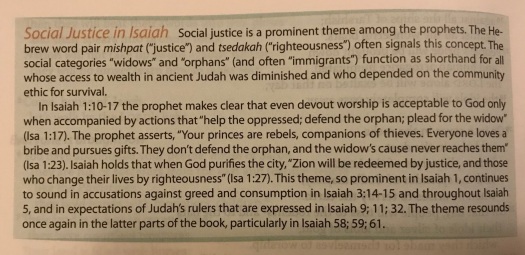Introduction to Isaiah: This is the first of the prophetic books. Introduction in CEB makes this book sound pretty interesting. I want to get into the text, but I need to definitely reread this later. In fact, I think that once I’m done and start to explore writing a book, I will come back to all of the introductions to each individual book, the introductions to different sections in the Bible, and the additional essays from each Bible. And I’ll read this source (here).
Here’s a little more tidbit from the Access Bible. It mentions that this book is divided into three major themes: “First is the unity and destiny of Israel as the people of the Lord God as they face the threat posed by imperial domination from Mesopotamia (Assyria, Babylonia, and Persia). Second, Jerusalem is the spiritual center and symbol of Israel’s role among the nations of the world. Third, the Davidic dynasty bears a specific significance” (p. 927).
Pretty interesting. Also interesting that this book was apparently put together over several centuries. And the book has been organized into 6 units. Helpful.
Isaiah 1: From the notes: “This initial chapter hints at many but not all of the major themes to follow in Isaiah. It focuses on injustice among Jerusalem’s leading citizens. Neglect of widows and orphans and other societal sins are viewed as punishable rebellion against God. God’s actions against rebels may be severe but are intended to redeem the city and restore its justice” (p. 1095 OT).
This is a really interesting chapter. The first part calls out the worshiping practices of the people. The authors calls into question what they are doing while the oppressed are in need of so much help. The people are being chastised for neglecting those in most need. I gotta say, this just rings true of so many things going on right now in our country. Although we don’t hear to much about it anymore, there are still families separated at our southern border and children are still not with their families.
The chapter ends with Isaiah telling the people that Jerusalem will be purified by God if they don’t change their ways.
Isaiah 2: The start of this chapter seems to present Jerusalem as a future place where all people will come to worship. They won’t need their weapons in Jerusalem. We then get to a promise that one day God will right all the wrongs in Jerusalem. He seems to warn the innocent to hide so they are protected from God’s wrath.
I’m really curious what the metaphor here is. Was the purpose of this text to scare people?
Isaiah 3: We see Isaiah criticizing Jerusalem’s elite people. And the criticism is pretty intense. Pretty much all of these people are going to be destroyed because of their wicked ways.
Here is a sidebar from Isaiah 3 in the CEB version (p. 1100 OT):

Psalm 97: It’s been several months since I read one of the psalms. I’m reminded that I really just don’t get the psalms. I’m not a big fan of poetry, so that’s probably part of the problem. But it’s again just more of heaping praise on God. I really need to find a text that I can read to help me better understand the Psalms.
Psalm 98: And yet again, another Psalm that encourages us to heap praise to God for a bunch of things. I really need to find something to help me with these things.
